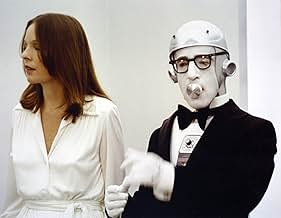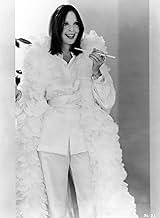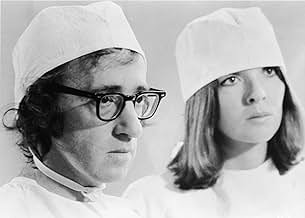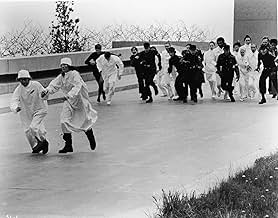A nerdish store owner is revived out of cryostasis into a future world to fight an oppressive government.A nerdish store owner is revived out of cryostasis into a future world to fight an oppressive government.A nerdish store owner is revived out of cryostasis into a future world to fight an oppressive government.
- Awards
- 2 wins & 2 nominations total
Mews Small
- Dr. Nero
- (as Marya Small)
Stanley Ralph Ross
- Sears Swiggles
- (as Stanley Ross)
John Cannon
- Various Voice-Overs
- (voice)
- (uncredited)
Myron Cohen
- Robot Tailor
- (uncredited)
- Director
- Writers
- All cast & crew
- Production, box office & more at IMDbPro
Featured reviews
Before he became a "serious" filmmaker and gained the respect and admiration of film critics, Woody Allen was already entertaining millions of fans with such unashamedly silly comedies as 1973's 'Sleeper.' The science-fiction story concerns an unfortunate Miles Monroe (Allen), the 1970s owner of the Happy Carrot health-food store, who goes into St. Vincent's Hospital for a routine peptic ulcer operation and wakes up 200 years later in a terrifying police state. He is revived by a subversive underground rebel organisation to help uncover the secrets of the dreaded "Aries Project," and to overthrow the tyrannical government and its dictator. Along the way, Miles enlists the help of the neurotic and exuberant Luna Schlosser (Diane Keaton, who collaborated with Allen on multiple occasions, most notably in 'Annie Hall (1977)' and 'Manhattan (1979)').
A chaotic blend of razor-sharp satire and slapstick humour, 'Sleeper' contains enough of Allen's and co-writer Marshall Brickmann's trademark wit to remind us of what makes their later collaborations so brilliant. Of course, as Allen had yet to reach his creative peak, some of the jokes in the film work (the infamous Orgasmatron; the Volkswagen Beetle that starts up immediately after 200 years of neglect), whilst others aren't pulled off quite so well (the giant chicken; the mock Miss America pageant). In one memorable sequence, year 2173 historians show Miles a collection of historical items and photographs, and he idly gives off ridiculous explanations which they accept as fact. For example, yes, Howard Cosell's sporting reports were used as punishment for criminals who had committed a crime against the state!
The promotional posters for the film proclaimed: "Woody Allen Takes A Nostalgic Look At The Future." This, more than likely, refers to the style of comedy, which, aside from Allen's witty observations, very much evokes memories of the silent slapstick comedies of Lloyd, Keaton and Chaplin. Much like the latter did with most of his films, Allen wrote, directed, starred in and composed the score for 'Sleeper.' The score itself, which is very upbeat, New Orleans-style traditional jazz, was performed by the Preservation Hall Jazz Band with Allen sitting in on clarinet. 'Sleeper' may have been inspired by H.G. Wells' classic novel, 'The Sleeper Awakes,' which recounts the tale of a man who awakes from a 203-year sleep to find himself in a horrifyingly-transformed futuristic London.
Aside from including a wealth of instantly-quotable one-liners ("I'm not really the heroic type. I was beat up by Quakers"), Allen also has a lot of fun in his disorganised futuristic dystopia. After pouring too much "Instant Pudding" into a bowl, the overdone dessert practically comes to life and has to be beaten into submission with a broom; it is also revealed that, contrary to popular agreement in 1973, such substances as deep fat, tobacco and hot fudge are not only not unhealthy, but probably the best thing for your body! When Miles happens upon a garden of human-size fruit and vegetables, we just know that the giant banana peel is going to come into play somewhere, and, sure enough, Miles inevitably takes a tumble.
A chaotic blend of razor-sharp satire and slapstick humour, 'Sleeper' contains enough of Allen's and co-writer Marshall Brickmann's trademark wit to remind us of what makes their later collaborations so brilliant. Of course, as Allen had yet to reach his creative peak, some of the jokes in the film work (the infamous Orgasmatron; the Volkswagen Beetle that starts up immediately after 200 years of neglect), whilst others aren't pulled off quite so well (the giant chicken; the mock Miss America pageant). In one memorable sequence, year 2173 historians show Miles a collection of historical items and photographs, and he idly gives off ridiculous explanations which they accept as fact. For example, yes, Howard Cosell's sporting reports were used as punishment for criminals who had committed a crime against the state!
The promotional posters for the film proclaimed: "Woody Allen Takes A Nostalgic Look At The Future." This, more than likely, refers to the style of comedy, which, aside from Allen's witty observations, very much evokes memories of the silent slapstick comedies of Lloyd, Keaton and Chaplin. Much like the latter did with most of his films, Allen wrote, directed, starred in and composed the score for 'Sleeper.' The score itself, which is very upbeat, New Orleans-style traditional jazz, was performed by the Preservation Hall Jazz Band with Allen sitting in on clarinet. 'Sleeper' may have been inspired by H.G. Wells' classic novel, 'The Sleeper Awakes,' which recounts the tale of a man who awakes from a 203-year sleep to find himself in a horrifyingly-transformed futuristic London.
Aside from including a wealth of instantly-quotable one-liners ("I'm not really the heroic type. I was beat up by Quakers"), Allen also has a lot of fun in his disorganised futuristic dystopia. After pouring too much "Instant Pudding" into a bowl, the overdone dessert practically comes to life and has to be beaten into submission with a broom; it is also revealed that, contrary to popular agreement in 1973, such substances as deep fat, tobacco and hot fudge are not only not unhealthy, but probably the best thing for your body! When Miles happens upon a garden of human-size fruit and vegetables, we just know that the giant banana peel is going to come into play somewhere, and, sure enough, Miles inevitably takes a tumble.
A futuristic comedy from Woody Allen in 1973 has him waking up from an operation 200 years later (in 2173) to find society has gone berserk.
Clever, witty, and very funny. Allen is hysterically funny as the "sleeper" who gets to give history lessons on the 1970s, pose as a robot, and become a revolutionary to be near Diane Keaton.
Filled with sight gags galore and great one-liners. The giant vegetables and chicken are funny. And so is the "1984" political humor that fits the Bush era better than it did the Nixon era. Also very funny is Allen's extended Blanche du Bois speech.
Allen is excellent as is Keaton. John Beck plays a revolutionary. Mary Gregory is the doctor. George Furth is a party guest. Jackie Mason does the voice of the Jewish tailor.
A must see.
Clever, witty, and very funny. Allen is hysterically funny as the "sleeper" who gets to give history lessons on the 1970s, pose as a robot, and become a revolutionary to be near Diane Keaton.
Filled with sight gags galore and great one-liners. The giant vegetables and chicken are funny. And so is the "1984" political humor that fits the Bush era better than it did the Nixon era. Also very funny is Allen's extended Blanche du Bois speech.
Allen is excellent as is Keaton. John Beck plays a revolutionary. Mary Gregory is the doctor. George Furth is a party guest. Jackie Mason does the voice of the Jewish tailor.
A must see.
No question that Woody Allen's earliest films were the most unpretentiously humorous, and Sleeper stands out among them. The conception of a frozen Allen waking up centuries in the future allows for plenty of biting satire on America in the 70's, not that we don't have plenty of good old-fashioned slapstick to boot. The bit with the Jewish robot tailors knocks me out no matter how many times I see it ("o-KAY, ve'll take it IN").
In this early Woody, most of his shtick is already in evidence. And, for quite a while, the jokes are funny. But after a while, the jokes start repeating and the film just lies there, a noisy unwieldy mess with Woody and Diane arguing repeatedly and noisily.
It seems to me that Woody here is rather strongly influenced by Chaplin's "Modern Times" which I'm also not a fan of. But Chaplin had an undeniable gift for physical humor which Woody does not. Later on, Woody became more pretentious in an effort to be profound, especially when he was trying to channel Bergman.
I have found it typical of all the Woodies I've seen more than once, that I can't really watch it again. If you think I'm not a fan, you are right!
6 out of 10.
It seems to me that Woody here is rather strongly influenced by Chaplin's "Modern Times" which I'm also not a fan of. But Chaplin had an undeniable gift for physical humor which Woody does not. Later on, Woody became more pretentious in an effort to be profound, especially when he was trying to channel Bergman.
I have found it typical of all the Woodies I've seen more than once, that I can't really watch it again. If you think I'm not a fan, you are right!
6 out of 10.
Sleeper was a very interesting project for Allen. He had spent time doing stand up, and up until this, his movies had been written around the jokes. With the exception of Play it Again, Sam, they were a series of sketches loosely tied into a weak plot. Sleeper was the beginning of the end of this. While the plot is somewhat "sit-com-ish", it was still there, and viewers always kept it in mind. It was also loose enough that Allen could incorporate scenes paying homage to the early silent film stars (the scene with the flying suits is my personal favorite). Miles Monroe was also a rip off from Bob Hope's cowardly hero personalities, but Allen gave it his own twist, and, in my opinion, made it much better. All in all, Allen achieved the perfect blend of slapstick and substance for those in need of a simple comedy. It lacks the depth of some of his better films, but if you want to laugh, this is for you.
Oh, and if you find it somewhat intellectually devoid, try Love and Death. It was his next film, and he added less slapstick and more highbrow comedy, as well as a little more real drama and substance.
Oh, and if you find it somewhat intellectually devoid, try Love and Death. It was his next film, and he added less slapstick and more highbrow comedy, as well as a little more real drama and substance.
Did you know
- TriviaWoody Allen originally intended the film to be three hours long and in two parts. The first part would have him in the present day, coping with life until his illness. And the second half would be the futuristic part. But United Artists rejected this concept.
- GoofsLuna's shoes change from high heels to flats when she crosses the lake on Miles' back (in the "raft" costume).
- Quotes
Luna Schlosser: It's hard to believe that you haven't had sex for 200 years.
Miles Monroe: 204, if you count my marriage.
- ConnectionsEdited into Intimate Portrait: Diane Keaton (2001)
- SoundtracksTill We Meet Again
(1918) (uncredited)
Music by Richard A. Whiting
Lyrics by Ray Egan
Performed by Woody Allen
- How long is Sleeper?Powered by Alexa
Details
- Release date
- Country of origin
- Languages
- Also known as
- El dormilón
- Filming locations
- Sculptured House - 24501 Ski Hill Drive, Golden, Colorado, USA(mushroom shaped building, top of mountain on south side of I-70)
- Production companies
- See more company credits at IMDbPro
Box office
- Budget
- $2,000,000 (estimated)
- Gross US & Canada
- $18,344,729
- Gross worldwide
- $18,344,868
Contribute to this page
Suggest an edit or add missing content









































